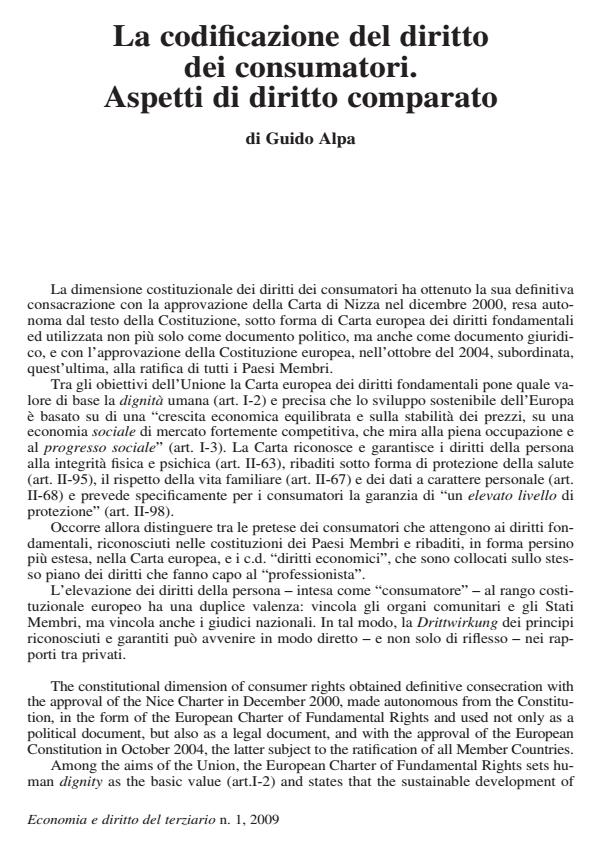La codificazione del diritto dei consumatori. Aspetti di diritto comparato
Journal title ECONOMIA E DIRITTO DEL TERZIARIO
Author/s Guido Alpa
Publishing Year 2009 Issue 2009/1
Language Italian Pages 15 P. 69-83 File size 575 KB
DOI 10.3280/ED2009-001003
DOI is like a bar code for intellectual property: to have more infomation
click here
Below, you can see the article first page
If you want to buy this article in PDF format, you can do it, following the instructions to buy download credits

FrancoAngeli is member of Publishers International Linking Association, Inc (PILA), a not-for-profit association which run the CrossRef service enabling links to and from online scholarly content.
La codificazione del diritto dei consumatori. Aspetti di diritto comparato - The constitutional dimension of consumer rights obtained definitive consecration with the approval of the Nice Charter in December 2000, made autonomous from the Constitution, in the form of the European Charter of Fundamental Rights and used not only as a political document, but also as a legal document, and with the approval of the European Constitution in October 2004, the latter subject to the ratification of all Member Countries. Among the aims of the Union, the European Charter of Fundamental Rights sets human dignity as the basic value (art.I-2) and states that the sustainable development of Europe is based on "balanced economic growth and price stability, a highly competitive social market economy, aiming at full employment and social progress"(art.I-3). The Charter recognizes and guarantees the right of individuals to physical and mental integrity (art.II-63), reaffirmed in the form of health protection (art.II-95), respect for family life (art.II-67) and protection of personal data (art.II-68) and specifically provides "a high level of protection" for consumers (art.II-98). Consequentially, a distinction should be made between consumer claims which adhere to fundamental rights, recognized in the constitutions of the member countries, and emphasised in the European Charter, and the so-called "economic rights", which are placed on the same level of those rights referring to the "professional". The elevation of individual rights - as a "consumer" - to European constitutional level has a dual value: it binds the Community institutions and the Member States, but it also binds national courts. In this way, the Drittwirkung of the recognized and guaranteed principles may take place directly - and not only as a consequence - in the relations between individuals.
Guido Alpa, La codificazione del diritto dei consumatori. Aspetti di diritto comparato in "ECONOMIA E DIRITTO DEL TERZIARIO " 1/2009, pp 69-83, DOI: 10.3280/ED2009-001003